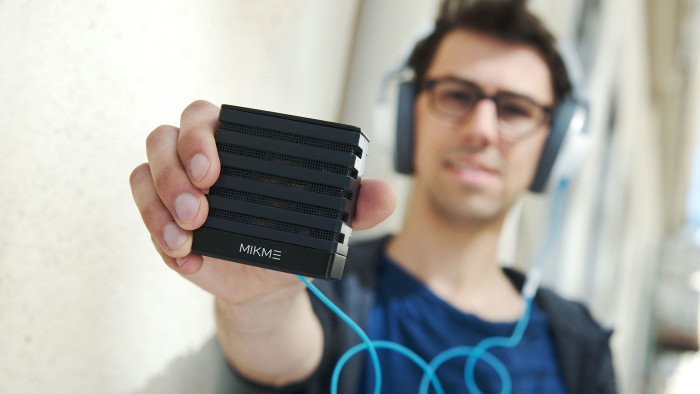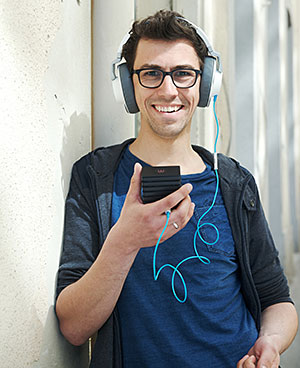Viennese start-ups: strong on funding, weak on ambition

Roula Khalaf, Editor of the FT, selects her favourite stories in this weekly newsletter.
In the US, tech companies are famously founded in entrepreneurs’ garages. In Vienna, they are more likely to start life in workshops under railway arches.
In such a venue, in an area popular for parties and clubs around the Spittelau U-bahn station north of Vienna’s historic centre, preparations are under way for the launch of Mikme — high-quality microphones that record wirelessly to smartphones.
Mikme is one of Vienna’s big start-up hopes. Founded by audio engineer and pianist Philipp Sonnleitner two years ago, the company has been likened to an audio equivalent of GoPro, the California-based action camera company.
For Mr Sonnleitner, a lanky 37-year-old graduate of Graz technical university dressed in jeans, hoodie and trainers, the attraction of Vienna is its character and easy-going lifestyle. “If you go to Silicon Valley, it is like 50km of just one boring house after the other,” he says. “Here, I don’t have the feeling of living in a grey, boring office space.”
Vienna is also a good location, he believes, for an ambitious start-up aspiring to appeal to a generation of musicians releasing their own material online. As well as classical music, the city also has a reputation as a centre for electronic music. “We have a very long history of music, art — it has been very deeply connected to Austria, the Viennese, in the past couple of hundred years.”
Mr Sonnleitner launched Mikme after leaving AKG Acoustics, the microphone and headset company founded in Vienna in 1947. Mikme has five employees including him and his wife, plus 10 consultants, and a workshop with laptops, files and electronic parts strewn across chipboard desks.
What gives his company an edge, he believes, is the system it has developed for transmitting studio-quality sound to a smartphone without wires or complicated editing requirements. Production of the fist-sized rectangular microphones should start later this year at Karré, a Munich-based manufacturing company.
As many as 200,000 units could be manufactured annually by 2020, Mr Sonnleitner says. “Probably we won’t sell that in the first year but it has high potential.” Some 1,800 pre-orders have been placed by those who provided crowdfunding. The microphones will sell for €499 for the 16GB version, or €349 for one with less memory.
Mr Sonnleitner wants to be more than a hardware provider. His ambition is to provide a complete system, enabling artists to distribute music quickly and simply via social media.
The microphone can record audio using the Mikme app while the smartphone records video on a camera app. The aim, however, is to allow audio and video recording with the Mikme app.

“We want to have studio quality but you should be able to get it online two minutes after you have finished the interview, which will really add value for publishers,” he says.
Mikme is in talks with possible investors. The public sector support for start-ups in Vienna, he says, was great in providing initial capital. Mikme has received €200,000 in funding from Vienna city, a €500,000 loan from the Austrian government and $350,000 raised in 30 days on Indiegogo, the crowdfunder.
“In Austria, we have probably the best state grant system in the world,” Mr Sonnleitner says.
More difficult is finding funding to take companies without a track record from the €1m to the €3m-€5m range, he says. In the US “the chances would be really good. Here that’s a bit harder.”
His view is echoed in Vienna’s Town Hall. “We have a very good public support system for young start-ups but very often find a lack of venture capital,” says Renate Brauner, vice-mayor with responsibility for finance.
Another Austrian problem is the time it takes to set up companies — more than 20 days, which is much longer than in France or Germany, according to World Bank data.
Mr Sonnleitner says Austrian start-ups do not think big at an early stage, preferring to concentrate on German-speaking markets. “Often a lot of people just think locally and very small scale. To live in Austria, be open minded and think globally is sometimes a pain.”
To become a famous Austrian you must first go to the US, he jokes. Mikme says it is looking to co-operate with artists, video makers and brands with large audiences in both the US and Europe.
“Arnold Schwarzenegger is the perfect example,” he says. The Terminator actor left Austria and eventually became governor of California. “Now, he is probably the most famous Austrian.” The lesson from Schwarzenegger for Austrian start ups? Mr Sonnleitner says: “Think globally — from the start.”
Comments